Top News

December 17, 2014 Ryukyu Shimpo
An open lecture titled, “Exploring the emotional wounds of the Battle of Okinawa” was held on December 13 in Nishihara Town. A woman who experienced the Battle of Okinawa and has suffered Post-Traumatic Stress Disorder (PTSD) symptoms for many years told of her agony and hardships. Two psychiatrists advised that allowing patients to share their pain would relieve them.
Tsuruko Uchihara, 84, who experienced the Battle of Okinawa at the age of 14, escaped from the battlefield in the southern part of mainland of Okinawa. The memory of stepping on corpses on the way to escape, plagued her. On the night of that experience, she apologized to the dead, kneeling on the ground, saying, “I’m really sorry because I could not see anything in the middle of the night.” However, she could not sleep, because she could not forget the feeling of stepping on the corpses.

Tsuruko Uchihara, a survivor from the Battle of Okinawa, spoke out her experience in Nishihara Town on December 13.
After the war, she became a teacher. When 40 years had passed after the war, she began to suffer pain from an unknown cause, a burning sensation coming up to the top of the body from the soles of the feet. Surgery and acupuncture did not help ease her pain away. She retired from her job at 55 years of age. She had to spend about 30 years almost bedridden.
A breakthrough came when she met Doctor Ryoji Aritsuka in 2011. “I was relieved from the pain when I realized my pain was caused from the war. Maybe it was helpful to talk with other people who suffered with the same experience. I was able to ease my pain.”
Aritsuka, her attending physician, said, “patients should be given a proper diagnosis, and they have to know that they are not isolated from others. These things will lead them to be cured.” Furthermore, the doctor said, touching on his experience in Fukushima, said, “There are many patients who suffered from the same unexplained symptoms in Fukushima as PTSD patients from the Battle of Okinawa. Some patients improved their health with the same treatment as that given to PTSD patients from the Battle of Okinawa. The survivors of the Battle of Okinawa taught me this treatment.” He said he was grateful to them.
Doctor Takashi Inada, physician of Kai Mental Clinic, reported cases where youth and dependent patients, who had been isolating themselves from society and suffered from addiction, succeeded in recovering their normal lives. He suggested three important points to consider: (1) patients need to be accepted by other people. (2) They have their own places. (3) They have to believe they can achieve something. The doctor also said, “When I listen to the experiences of survivors who are striving to live out their lives despite being wounded in war, I feel a certain hope.”
(English translation by T&CT)
Go to Japanese
December 20, 2014 Ryukyu Shimpo
On December 19, the Okinawa Prefectural Government (OPG) announced the number of tourist visitations to Okinawa from January to November 2014. The number was 6,507,000, a new yearly record, exceeding 6,413,700 in the calendar year of 2013(from January to December 2013). This represents a 15.2 percent increase over the same period the previous year. A spokesperson for the OPG, said, “The number of tourists visiting Okinawa in the calendar year of 2014 will surely reach 7 million for the first time.” With tourism boosted by the cheap yen, the number of foreign tourists visiting Okinawa was up by 61.1 percent to 828,800 over the same period the previous year, setting a new record. This has contributed to the growth in the number of tourists visiting Okinawa this year.
The number of tourists coming from other areas of Japan from January to November 2014 was up by 5.5 percent to 5,678,200.
An expansion of air routes and an increase in the number of cruise ships visiting Okinawa boosted the number of tourists coming from in and outside of Japan.
Some Japanese people have refrained from traveling overseas because of the cheap yen. There has been high demand for travel to Okinawa from other areas of Japan.
A total of 564,500 people visited Okinawa in November, up by 9.9 percent over the same period the previous year. This is the 26th consecutive month in which the previous year’s figures have been exceeded. While the number of foreign tourists visiting Okinawa increased by 68.4 percent to 56,400, the number of domestic tourists visiting Okinawa was up by 5.8 percent to 508,100.
In November, the number of tourists from Taiwan, which accounted for the largest percentage at 30.5 percent of the total, increased by 79.2 percent to 17, 200. Those from South Korea increased by 2.2 times to 15,100.The number visiting from mainland China increased by 43.1 percent to 7,300.
The expansion of airline routes and an increase in the number of larger aircraft have contributed to the growth.
The number of tourists from the Tokyo area, which accounted for about 50 percent of the total, increased by 4.1 percent to 249,200 owing to the increase in group tours such as school trips. Those from the Kansai area were up by 10.6 percent to 94,800 because of the steady increase in the use of low-cost carriers.
(English translation by T&CT)
Go to Japanese
December 21, 2014 Ryukyu Shimpo
On December 21, the Okinawa Police Station arrested a military police officer stationed at the U.S. Kadena Air Base on suspicion of driving under the influence of alcohol (violation of traffic law in Japan). According to police, the suspect has admitted to the charge that he was driving a car under the influence of alcohol on a road in Miyagi, Chatan. About twice the legal limit of alcohol was detected in the suspect’s breath. The breath-alcohol concentration limit for driving is 0.15 mg/l in Japan. At 11:38 p.m. on December 20, police officers on patrol found the suspect driving a car dubiously in the residential area at Miyagi, Chatan, and ordered him to stop his car. They arrested him at the scene after detecting alcohol on in his breath. Riding in his car, there were also two acquaintances of the suspect. The U.S. military police officer confirmed that they drank at his home in Chatan. He was taking them to their homes in his car.
On December 9, U.S. forces in Japan eased its ‘liberty policy’, which is the off-base code of conduct for U.S. service members and its civilian personnel on Okinawa during off-duty hours. After that, two incidents by U.S. service members involving drinking have taken place. On December 18, a captain assigned to the U.S. Army Torii Station in Yomitan Village was arrested for obstructing officers from performing their duty. According to the police, the captain was drunk when he assaulted an Okinawn police officer who was questioning him.
(English translation by T&CT)
Go to Japanese
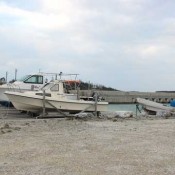
December 18, 2014 Haruko Tabuki of Ryukyu Shimpo
The Okinawa Institute of Science and Technology (OIST) will build a “maritime experiment facility (tentative name),” for research and observation of marine life, at the site of Seragaki Fishing Port in Onna Village.
It will be the first OIST research facility to be built in the area.
The institution plans to carry out ecology investigation aimed at exterminating acanthasters in cooperation with the Onna Fisheries Cooperative. It also intends to study marine life in the East China Sea, and ocean currents.
Many people hope the construction of the new facility will contribute to promote local industries, education, and research works with other organizations in the area.

According to OIST, researchers at the facility will collect marine organisms and temporarily house them for study.
At a site of about 9 square-meters, the institution will build a rearing facility and marine water withdrawal facility for raising marine organisms. The design work of the facility will be completed this fiscal year. OIST will start building the facility from next fiscal year.
OIST has not yet had its own facility for collecting marine life. It has been collecting and studying them at Sesoko Island’s Sesoko Research Center run by the University of Ryukyus.
Building the new facility at Seragaki Fishing Port, only 10 minutes away from the institution, will help streamline research activities, according to OIST.
OIST researchers have carried out long term biological research for acanthasters, working with the Onna Fisheries Cooperative, which is involved in preserving coral reefs. Setting up the new facility could further strengthen their relationship.
In addition to collaborative projects, fishermen from the cooperative will help OIST’s researchers by using research ships to collect marine life.
The head of the cooperative Masami Yamashiro said, “I expect research results will contribute to develop aquafarming and fishing.”
An OIST spokesperson said, “The new facility will be useful for collaborative projects with the cooperative and researchers who carry out research on marine life in East China Sea.”
Onna Village Mayor Fumiyasu Shikiya said, “The new facility could contribute to promoting the village by giving a boost to the village’s fishing industry and preserving the environment.”
The fishing port was built in 2010, and is managed by the village. About 20 to 30 fishermen as well as tourist divers are currently using the port.
(English translation by T&CT)
Go to Japanese
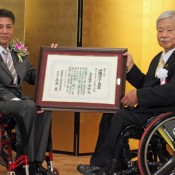
December 10, 2014 Ryukyu Shimpo
Paralympian athlete Hirokazu Ueyonabaru, 43, was awarded the grand prize in the 19th Okinawa Colony Award on December 9. The award ceremony was held at the Naha Terrace Hotel in Naha. The award is given to physically disabled people and groups of people, who have contributed to self-reliant activities in social, economic, cultural and various other fields.
Ueyonabaru is engaged in efforts to grow and expand parasports, and he plays an active part as a sportsman. He received the award certificate and prize from Yutaka Takamine, the chairperson of Okinawa Colony Award executive committee.
Ueyonabaru said in his speech, “I want to step up further, and pass on what I have learned to other people.”
He became a quadriplegic at the age of 28 due to a motorbike accident. He first took part in parasports in a wheelchair race, which was part of a rehabilitation program. In 2008, he won a silver medal in the men’s marathon in the 2008 Summer Paralympics in Beijing, China. He won a gold medal in the men’s 800-meter wheel chair track and field event in the Incheon 2014 Asian Para Games, Korea.
Ueyonabaru is a member of the Okinawa Association of Athletics Federations for the Disabled. He takes part in activities to expand sports opportunities for people with disabilities, and is frequently asked to give lectures.
He said, “I want to participate in the Tokyo Paralympic Games in 2020, and want people to show that we can do anything we want to do regardless of the age if we try hard.”
(English translation by T&CT, Hitomi Shinzato)
Go to Japanese
December 16, 2014 Ryukyu Shimpo
On December 16, the Okinawa City Council unanimously adopted a protest resolution and opinion letter over a hit-and -run incident involving a U.S. military officer. The incident occurred at Misato, Okinawa City, on December 4, and a U.S Marine Major is under investigation as a suspect. The resolution, urges the U.S ambassador to Japan and the U.S military to make a rapid apology to the victim and provide full compensation for him.
It demands that preventive measures be carried out through education for U.S service members and that ‘liberty policy’ restrictions on drinking off-base are re-imposed.
The council takes seriously that incidents such as hit-and-runs and drink driving incidents by U.S. service members have taken place frequently in many places. The resolution states that the U.S military should find a drastic solution to prevent incidents and accidents, and asked that this solution be reported to the council. With regard to the liberty policy, which was eased on December 9, the council pointed out that the policy has not prevented incidents, and that the military should further strengthen its rules and discipline.
The council will send this resolution and opinion letter to eight destinations, including the speaker of the House of Representatives and the president of the House of Councilors.
(English translation by T&CT)
Go to Japanese
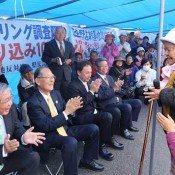
December 16, 2014 Ryukyu Shimpo
On December 16, Seiken Akamine, Kantoku Teruya, Denny Tamaki and Toshinobu Nakazato, who were elected in single-seat constituencies in Okinawa’s House of Representatives poll, visited the sit-in protest site at U.S. Marine Camp Schwab. About 70 citizens cheered passionately for them. In front of the gate of Camp Schwab, citizen groups continue the sit-in protest against construction of a new U.S. air base to replace U.S. Marine Corps Air Station Futenma in Ginowan.
Akamine said, “Any plans with conditions of relocation of the Futenma base within Okinawa won’t resolve the Okinawa U.S. base issues. The Futenma base should be removed without condition of relocating it to Henoko.”
Teruya, who was elected in the 2nd district in which many U.S. military bases are concentrated, stated, “We are facing a situation in which the Abe administration is changing the Peace Constitution, and that it is driving Japan at breakneck speed to once again become a war nation. I want to fight against the Abe administration with you.”
Tamaki, who was elected in the 3rd district which includes Henoko, Nago, declared, “For the last two years, I have realized that we can persuade the governments of Japan and the United States, if we follow-through and do what we must. With pride, we are striving to solve the Henoko issue with Govenor Takashi Onaga, Nago Mayor Susumu Inamine, Nago citizens and all Okinawan people.”
Seventy-seven-year-old Nakazato, who was elected as a member of the House of Representatives for the first time, said, “I have many things to learn. But I have a personal belief that I must not accept the reclamation of this beautiful sea. I will strive to do my best with you.”
Hiroshi Ashitomi, co-representative of the Helicopter Base Objection Association, said, “I feel an aura coming from the four representatives. We will support them in their efforts to convey the voices of the people of Okinawa to people across the country.”
(English translation by T&CT)
Go to Japanese
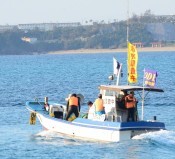
December 15, 2014 Ryukyu Shimpo
On the morning of December 15 overnight after a national House of Representatives election, underwater research activities by the Okinawa Defense Bureau were confirmed off the coast of Camp Schwab in the Henoko district of Nago. The U.S. and Japanese governments plan to relocate U.S. Marine Corps Air Station Futenma to the area.
By 9 p.m., at least eight research ships had left Teira Fishing Port.
About 80 citizens gathered in front of the Camp Schwab gate and celebrated the outcome of the House of Representatives election, in which four candidates against construction of the new base won all the Okinawan seats.
Ashitomi Hiroshi, co-representative of the Helicopter Base Objection Association, said in his speech, “Four candidates who will support Okinawa Governor Takeshi Onaga, won the election. Okinawan democracy is the fruit of grass-roots civil movements.”
(English translation by T&CT)
Go to Japanese
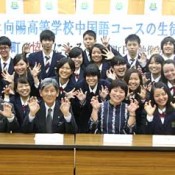
December 15, 2014 Ryukyu Shimpo
Yaese Town and 26 students belonging to a Chinese course in Koyo High School have co-created a promotional video about the town in Chinese.
On November 28, they screened the movie at the school.
The students worked in 8 groups to create the video, which conveys the charms of the town such as traditional events, cultural assets, gourmet foods, and a traditional fishing technique.
The movie consists of a one-minute-photographic slide show with music. It has Chinese subtitles. The students were in charge of the translation.
One-B group introduced viewers to the great lions carved in stone of the Tomimori district, saying, “Yaese Town has many great lions” in Chinese. One-D group explained that visitors to the town could buy fresh vegetables and cakes made of locally-produced vegetables, at a morning bazaar.
Two-B group showed fishermen passing the traditional fishing technique from generation to generation.
The Town Mayor Hougi Hiyane said, “Although we are taking advantage of local resources and encouraging tourists to stay in the town and visit tourist spots here, the tourism industry has not yet taken off in general. Students who will be major players in the next generation, promoted our town in Chinese. It will hugely contribute to develop the town.”
(English translation by T&CT)
Go to Japanese
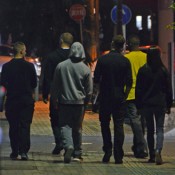
December 10, 2014 Ryukyu Shimpo
On December 9, U.S. forces in Japan eased its ‘liberty policy’, the code of conduct for the U.S. service members and civilian employees in Okinawa. The new regulation allows them to stay out and drink somewhat freely during off-duty hours. The U.S. military notified the Okinawa Prefectural Government about the change to code of conduct measures on November 26, alleging that the number of incidents and accidents involving U.S. military personnel had decreased. Despite that, during the following 11 days, four incidents and accidents, involving drunken American soldiers, took place. However, concerns are spreading among local people.
The new rules allow U.S. service members to drink relatively freely off base except between midnight and 5 a.m. They have been limited to drink only two canned beers at off-base restaurants, not including bars, at supper time between 6 p.m. and 10 p.m. Service members who are E5 (sergeant rank or equivalent) and below are also allowed to stay out accompanied by superiors.
Heads of the local municipal governments of cities, towns and villages, where the U.S. military bases are located, protested the U.S. military’s measure and proposed to postpone the implementation of it.
At 9 p.m. on December 9, there were seven or eight people seemingly U.S. military personnel at Gate Street near Kadena Air Base. However, pedestrian traffic was sparse in towns near the U.S. bases.
A shop owner said, “We can’t tell you whether the measure will have an effect on our business until the weekend comes. “ An employee of a store at Miyagi, Chatan, where a lot of housing for U.S. military personnel is located, said, “We welcome an increasing number of customers. But, we do not want them to cause trouble.”
(English translation by T&CT)
Go to Japanese
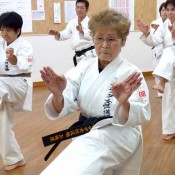
December 11, 2014 Ryukyu Shimpo
75-year-old Tsuneko Machida from Uechi Style Ageda Women’s Karate School in Adaniya, Kitanakagusuku Village passed a level four test. Tsuneko joined the Karate School when she was 63 years old. For 12 years, she regularly attended practices on Wednesdays and Fridays and showed a lot of discipline. It is rare for a 65-year-old person to start learning Karate, and pass the test at 75-year-old. Students from the school celebrated her achievement.
As a child, Tsuneko was interested in Karate. When she asked to join a Karate school at the age of 20, she was rejected. At that time, Karate schools were mostly closed to women. While she instead practiced Ryukyuan dance, her interest in and passion for Karate grew.
Learning about a Karate school only for women, Tsuneko joined the school to make Karate her last enrichment lesson. Tsuneko has trained under coaching by Master Hatsuko Machida. Focusing on disciplining the body rather than becoming strong, Tsuneko has practiced Karate.
Tsuneko has never missed lessons. She said, “I continued because I like it. I have never thought of missing a lesson. Thankfully, my lower body is now strong. I gained more stamina and have not caught a cold. I would like to keep myself healthy.”
Ageda Karate School for Women currently has more than 30 female students. Regarding the future of Okinawa’s traditional Karate, Tsuneko said, “I hope young people learn Karate and promote it.” Tsuneko passed the test on November 21. Wearing her black belt, she looks very dignified. At a co-ed lesson on the 3rd, she trained hard with 20 other students.
For more information about Ageda Karate School for Women, call 098 (935) 3600.
(English translation by T&CT and Megumi Chibana)
Go to Japanese










 Webcam(Kokusai Street)
Webcam(Kokusai Street)


